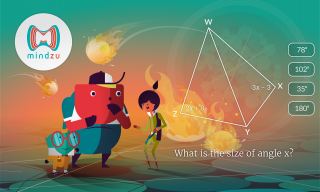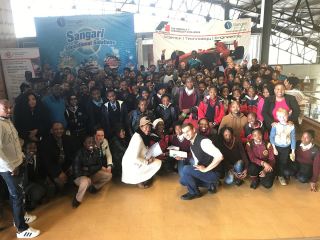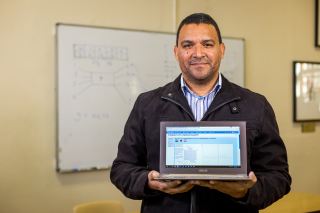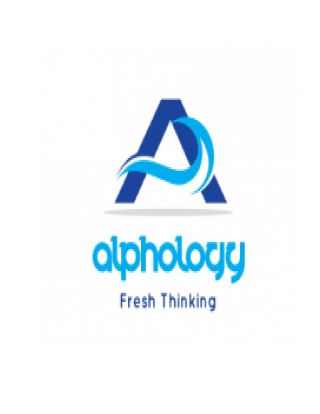Cape Town Startup's App Makes Grade 11 Maths Easy
Cape Town edtech startup Angaza has today released its mobile maths educational service in South Africa. Delivered via an Android app, MindZu (www.mindzu.com) is an exquisitely crafted learning experience, whose gorgeous graphics and slick interface just make you want to explore. And it is currently available for free.
According to Godfrey Parkin, a co-founder of Angaza, “Maths education in South Africa is in need of a real game changer. Classroom learning is failing learners, leaving them among the worst in the world in maths competencies. Most attempts at digital learning simply replicate those classrooms, using dull teacher-videos or online textbooks. There’s no learning management system, and they often require school-issued hardware. So they are impractical, expensive and uninspiring. MindZu is infinitely scalable because it runs offline on the learner’s own smartphone. It delivers a captivating gamified learning experience which covers the entire Grade 11 curriculum. And, for those who register early, it’s free, saving R240.”
In MindZu, learning is mission-based – you must rescue your friends from Castle Meh, using maths as your super-power. The pedagogy is powerful and effective, using cycles of learn-practice-play to embed competencies. Lessons are animated, using colour, characters, fantasy and fun. Every second of the one-year curriculum is stimulating and motivating. Learners are in control of what they learn, and how fast they learn it. Performance systems let them know what they missed, where they need to focus, and where they are brilliant. Gamified challenges and rewards are woven into personalised learning journeys. And learners are not alone – they can connect with others in their class or around the world. MindZu runs on basic Android smartphones, online or offline. And, even if you don’t register fast enough to get it free, its normal fee is a fraction of the cost of conventional e-learning.
Angaza’s goal is to disrupt high school education by making superb learning experiences affordable and universally accessible. The company wants to make MindZu available free to every Grade 11 learner this year to have an impact on Matric 2020.
To achieve this they are talking to potential sponsors in the CSI and brand marketing space. “For a contribution per learner as low as R5, MindZu can be free for learners,” says Parkin. “For a small investment you achieve a huge, immediate impact for the nation.”
MindZu is currently available in 43 countries. It is the culmination of years of work by a global team of educational writers, game developers, instructional designers, animators and user experience experts. Angaza’s founders are deeply experienced in education and technology. Khalaf Rashid was the resident partner and CEO of Macmillan Publishers in Tanzania. Karen Parkin is a UX expert with a history of computer games production and award winning digital projects in major European and US corporations. Kwang Lee is an artist, animator and creative director. Godfrey Parkin is a digital strategist, and was one of the original pioneers of e-learning in the US.
You can find out more about MindZu at www.mindzu.com.
Contact: Godfrey Parkin, CEO, at +27 21 794 7838 or This email address is being protected from spambots. You need JavaScript enabled to view it.
30 Schools do CAD Training for F1 in Schools Competition
Over the July holidays 170 pupils from 30 schools in the Gauteng region, including 30 teachers competed a computer Aided Design (CAD) introduction course in preparation for the 2017/18 F1 in Schools race season.
The training, provided by Sangari Education, was done at Tshwane University of Technology. The teams that attended are competing for the chance to go to the international competition in 2018.
“Students and teachers worked through tutorials, and on completion, each team designed their own F1 cars that will be competing in the racing scheduled to start in August,” said Pieter du Plessis, F1 in Schools programme manager at Sangari Education.
“Based on each team’s design, the F1 cars will be manufactured at Sangari Education’s offices overlooking the Kyalami race track. It is a great setting to prepare for the F1 in Schools competition,” he said.
The racing cars are designed using Siemens’ Solid Edge CAD software supplied locally by ESTEQ, who are also assisting Sangari with training of the teachers. This software is used for designing the shape as well as simulating the airflow allowing the design to be optimised before sending through for manufacture on a high-precision milling machine.
“The vehicles are then tested in a wind tunnel to ascertain the resistance characteristics and modifications are made if necessary.” The world record is 0.997 seconds for the F1 cars rocketing along the 20m race track.
In support of the F1 in schools Challenge the Gauteng Department of Education has deployed Technology Senior Education Specialists in every district to assist with the roll-out of the programme. The Department is excited to see the impact the experience will have on the learner’s ability to relate to the theory being taught in the technology syllabus and the overall improvement in Maths, Science and Technology results, said Mr du Plessis.
F1 in Schools is as an educational competition that promotes Science, Technology, Engineering and Mathematics (STEM) where schools build a model F1 racing car and compete in inter-school racing competitions. The winning team will represent South Africa at the international finals later this year,” said Bez Sangari, CEO of Sangari Education.
Pule Kgasoe, teacher at Aurora Girls High School in Soweto, who competed in the 2016/17 season, said: “The competition has raised our students’ work ethic. They are now more organised and disciplined, and the programme has created new interest in maths and science.”
“The F1 programme has also enabled students to gain more confidence as well as improve their time and resource management skills,” he said. “Team work has encouraged students’ on a journey of self-discovery. New career paths are being explored based on the various roles each student plays in the development of their F1 car.”
Mr Kgasoe said there is also more interest from other students who have seen the benefits from learning science and maths.” Mr Sangari added that the programme develops entrepreneurial skills in students who are required to research, prepare a business plan and build links with industry to gain sponsorship. Students gain first-hand experience in marketing and accounting as they need to provide a complete portfolio as part of the competition.
“The F1 competition focuses on blended learning through a cross curricula approach where learners physically apply what is learnt in the classroom. The true value lies in how learners take ownership of their own learning,” he said.
“What makes the F1 in Schools Technology Challenge different is that it entails a comprehensive and inclusive learning approach. Learners engage with subjects that improve their literacy, numeracy, sport and sports science, design and technology, art and design, textiles knowledge, STEM learning, computing, and business and enterprise,” concluded Mr Sangari.
Online assessment could improve maths marks of deaf learners
Online mathematics assessment (OMA) could help improve the mathematics performance of deaf and hard-of-hearing learners in South Africa.
This is one of the key findings of a new study at Stellenbosch University (SU).
“OMAs can help deaf and hard-of-hearing learners to understand difficult mathematical concepts and provide them with equal opportunities to do well in formal mathematics assessments,” says Dr Nolan Damon who is a mathematics teacher and blended-learning designer and trainer from Worcester. He recently obtained his doctorate in Curriculum Studies at Stellenbosch University.
Damon investigated the use of OMAs as an alternative form of assessment to current pencil and paper-based mathematics assessments which do not provide deaf and hard-of-hearing learners with a fair chance to showcase what they have learnt.
“Deaf and hard-of-hearing learners perform poorly in mathematics pencil and paper assessments because they struggle to read and understand written texts and to interpret mathematics questions posed in Afrikaans or English since neither Afrikaans nor English is their home language,” says Damon.
He adds that since these learners communicate through Sign Language, they struggle partly because of the difference between the structure and grammar of Afrikaans/English and Sign Language, the absence of a mathematics vocabulary in Sign Language, and their limited language skills.
Learners’ understanding of mathematical functions
As part of his research, Damon designed OMAs for Grade 8 learners at a school for the deaf and hard of hearing in the Western Cape. Apart from Damon and the learners, an interpreter was also involved in this study.
Damon used a quiz module in Moodle, which is a free and widely used open-source software package, as well as two mathematic software plugins (components that adds a specific feature to an existing computer programme) to test the learners’ understanding of mathematical functions which are crucial in our everyday lives. Moodle quizzes can be used for, among others, exams preparation, continuous assessments, and to measure learners’ understanding of content knowledge.
Damon says his experience as a teacher of mathematics to deaf and hard-of-hearing learners has shown that they struggle to understand mathematics concepts, in this case the function concept.
“Testing their understanding of mathematical functions is important because deaf students, for example, don’t hear or understand that fruit, meat or vegetables are sold per kilogram. They know the sign for it, but they find it difficult to grasp that if I pay R4, 00 for 2kg apples, the functional relationship can be applied to more bags of apples, etc.”
The Moodle quiz tested, among others, the ability of learners to determine rules for patterns and functional relationships using flow diagrams, tables, formulae and equations in line with the current National Curriculum and Assessment Policy Statement for Grade 7-9.
Damon observed the learners while they were completing the quizzes as part of the OMA to record their interactions with it. Apart from documenting their experience with the OMA, the learners were also interviewed by an interpreter about the possible advantages and disadvantages of the OMA. Damon then used this information to make adjustments to the OMA based on the learners’ feedback.
“Not only did the learners find it easier to do online quizzes as opposed to pencil and paper-based assessment, but the inclusion of a Glossary within these quizzes made it possible to have immediate access to difficult words and phrases.”
Damon points out that although the learners initially experienced difficulties with the OMA, their scores improved after a few adjustments were made to it.
“All the learners passed the test with marks above 60% and three learners obtained a score of 100%. Since an improvement in test scores are directly linked to an increase in the learners’ understanding, it can be argued that due to modifications to the OMA, their knowledge based on the function concept improved.”
Multimedia can enhance the learning process
Damon says each question within the OMA included an icon which the learners could click on for a video example to experience the mathematics concept that needed to be conveyed and to be guided through questioning. He adds that these 'help' features were extremely useful especially with the limited Sign Language concept vocabulary at hand.
“The study highlighted the value of incorporating multimedia such as videos, images, simulations, interactive content and other graphics within the OMA because deaf and hard-of-hearing learners are dependent on visual imagery for learning. These multimedia can reduce the cognitive load of interpreting texts and also enhance the learning process for these learners.”
“This is important because signs for concepts in mathematics are non-existent which makes it tough to translate these ideas via Sign Language without losing the essence of the math concepts.”Damon says the OMA allows learners to use smart phones, tablets and laptops to take the assessment.
“Sign Language can be incorporated within the OMA with ease which means these learners will be provided with assessments in their Home Language.”
“This OMA can assist these learners in their understanding of difficult concepts and can make their studies so much better if they have access to subject content in their own language, i.e. Sign Language.”“It also allows the teacher to create online assessments, and the computer captures the learners’ answers, scores it and provides immediate feedback to students.”
Damon adds that the OMA might also provide mathematics teachers with insights into the cognitive processes of deaf and hard-of-hearing learners while doing mathematics.
For the OMA to have the desired outcome teachers and deaf learners have to receive training in how to use Moodle, and software plugins such as GeoGebra, WIRIS, says Damon.
He adds that the OMA principles can also be used for Languages, Science and any other subject and universities can also benefit from his research.
Launch of alphology, a new method of teaching and learning.
Alphology is proud to announce its new website of the same title. This is a new Learner Teacher Support Material website that uses crossword puzzles as a means of teaching. It embraces the concept of Mindful Teaching=Mindful Learning which emphasizes that in order for effective learning to manifest, learners must be given the opportunity to learn while playing.
Alphology has recognized the fact that children/learners are not given the opportunity to play while at schools and when they do play at home, they do this excessively leading them to engage in truant behaviour. Gone are the days when children used to play as they are supposed to do. Children/learners learn better when they play and this website has Learner/Teacher Support Material for Maths, Setswana, Zulu, Ndebele and Xitsonga with more to come. Alphology has effectively been launched and is now live at http://alphology.co.za.
Parents and teachers are advised to get the learning material for themselves and children as this will help them improve dramatically.
The material is also suitable for the ordinary man in the street, more especially taxi drivers and those who want to preserve their language.
Many experts have hailed the materials as being new and innovative and that it will be warmly welcomed by the community as the first of its kind





